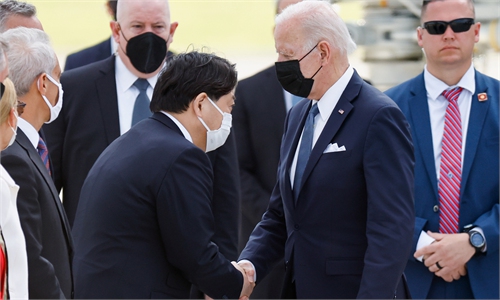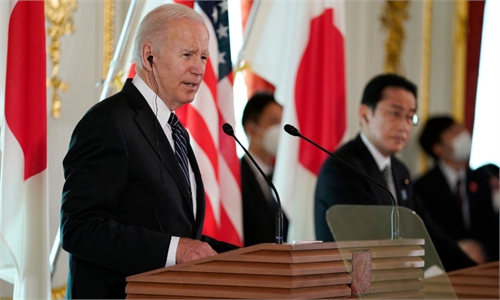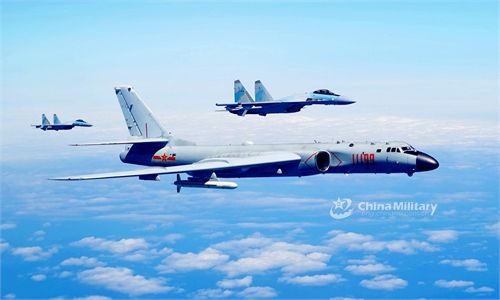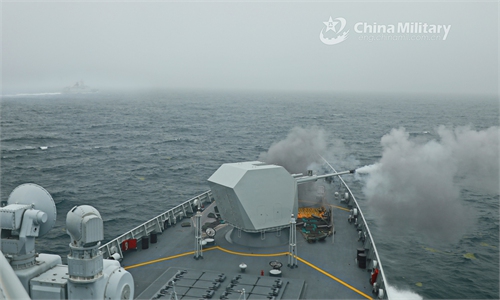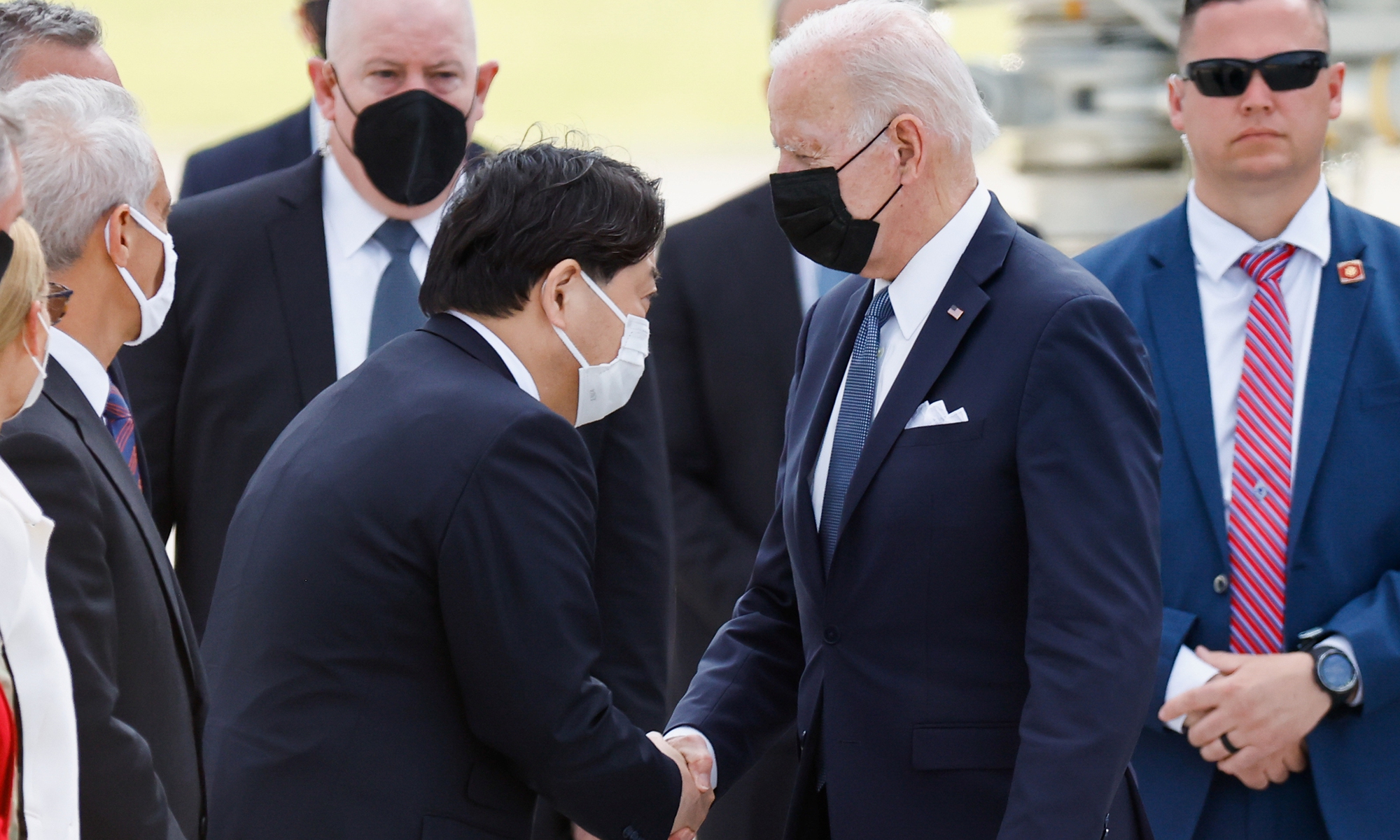
US President Joe Biden shakes hands with Japanese Foreign Minister Yoshimasa Hayashi upon his arrival at Yokota US Air Force Base in Fussa, on the outskirts of Tokyo, Japan on May 22, 2022. Photo: VCG
US President Joe Biden paid his first visit to Japan since taking office from Sunday to Tuesday. Biden had three agendas on his trip. The first was to meet Japanese Prime Minister Fumio Kishida to further consolidate the US-Japan alliance. The second was to officially launch the Indo-Pacific Economic Framework (IPEF), which includes US, Japan, Australia, India, South Korea, New Zealand and seven members of the Association of Southeast Asian nations (ASEAN). The third is to hold a second in-person Quad leaders' summit with his counterparts from Japan, Australia, and India. In terms of the agenda it can be concluded that, in this trip, Biden has concentrated on building a comprehensive multilateral framework to contain China in the Asia-Pacific region.It is widely known that the US sees that the rise of China is breaking the geopolitical order in the Asia-Pacific, severely challenging US dominance in the region.
Therefore, starting with the Trump administration, the Indo-Pacific Strategy has increasingly become synonymous for a US-led political group to counter China. After Biden took office, America's attempts to contain China have been upgraded from a trade war toward a comprehensive effort covering the fields of security, technology, economics and ideology. As the US's national power has also declined, it has attached increasing importance to the role of its allies.
Japan, the most important US ally in the Asia-Pacific region, and the most influential country on China's periphery, is of critical strategic importance.
The US is willing to promote Japan to become a vanguard in supporting its effort to contain China. For Japan, strengthening its leadership in the Indo-Pacific Strategy and effectively countering Beijing will help to highlight its important role in maintaining regional security and stability, as well as enhancing its international influence. Thus, Tokyo is very willing to assume such a role.
In this context, Japan has acted more in line with the ideological values, emphasized the "small cirques" consisted of "like-minded partners" and viewed China as heterogeneous. Hence, Japan increasingly regards China's rise as a revisionist actor while defining China as a threat to the"liberal and open world order." Besides, Japan also believes the Ukraine crisis gives China the opportunity to be more assertive in the Asia-Pacific region and more determined to resolve conflicts by force, including the Taiwan question.
Japan has increasingly emphasized that the island of Taiwan is homogeneous and views the island as a value-based partner without having formal diplomatic ties. So it was not surprising to see Japan twist the Taiwan question alongside the Ukraine crisis. As Tokyo sees the Taiwan question as part of the Indo-Pacific Strategy, China's position over the island of Taiwan is thus hyped by Japan as challenging the"liberal and open world order." Therefore, Japan has linked interfering in China's internal affairs with its broader Indo-Pacific goals and given itself a moral banner attempting to contain China with the Taiwan question.
As a result, , Japan issued a joint statement with the US in which the two blatantly clamor "the importance of peace and stability across the Taiwan Strait as an indispensable element in security and prosperity in the international community."It is likely that Japan will further ignore China's position over the Taiwan question and follow suit with the US in weakening the One China Policy in an attempt to conceal its moves towards national rearmament, superseding restrictions and strengthening its own defense in the view to further interfere over Taiwan.
Chinese State Councilor and Foreign Minister Wang Yi pointed out that bilateral cooperation between Japan and the US should not provoke bloc confrontation, let alone harm China's sovereignty, security and development interests. Japan, however, believes that in the context of strategic competition between China and the US, strengthening "deterrence" against China with the US-Japan alliance will help Japan enhance its international influence and political power status.
Meanwhile, Japan considers that China's strategic reticence toward Tokyo to reduce pressure from the US and gain support from more countries has led to a relatively relaxed security and economic environment for itself. However, Japan has in fact grossly interfered in China's internal affairs and seriously violated the basic spirit of the Treaty of Peace and Friendship between China and Japan, going astray by profiting for itself at the expense of its neighbors. By doing so, this will not only seriously shake the political foundation of China-Japan relations, but will also lead to a deep security dilemma in the region.
In this regard, China should first be guided by a "common, comprehensive, cooperative and sustainable" security concept, defining security by development rather than by threats, making joint efforts in building a constructive and stable China-Japan relationship that meets the requirements of the new era, and continuously strengthening economic cooperation and people-to-people exchanges. Secondly, regarding Taiwan, the Diaoyu Islands and other major issues that affect the political foundation of bilateral relations, China should "make clear the red lines and keep the bottom line." Lastly, China should continue to encourage dialogue and exchanges between the two countries at all levels and in different fields, establish a crisis response mechanism to manage conflicts, strengthen cooperation and economic interdependence with Japan in global governance, and avoid a complete "decoupling" and a loss of control of bilateral relations.
The author is a senior research fellow at Center for Asia-Pacific Studies, the Institute for Foreign Policy Studies under the Shanghai Institutes for International Studies. opinion@globaltimes.com.cn
